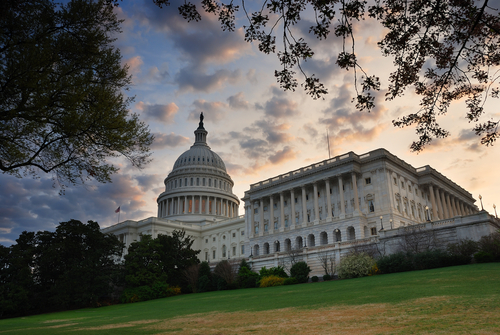The United (Police) State of America
Louis James: Doug, after conversations like the one we had last week, we often get letters from angry readers who accuse you of hating America, disloyalty, and perhaps even treason. These people don’t know or understand what I do about you — that you love the idea that was America. It’s the United State it has become for which you have nothing but contempt. Perhaps we should try to explain this to them?
Doug Casey: I doubt it would work; it’s a tough row to hoe, trying to explain things to people who are so set in their thinking that they truly and literally don’t want to hear anything that might threaten their notions. A person who feels threatened by ideas and who responds with emotion is acting irrationally. How can we have a discussion with someone whose emotion trumps their reason? How do we even begin to untangle the thinking of people who [gathered two weeks ago] to give thanks for the bounty produced by freedom and hard work — the famous puritan work ethic — by eating a turkey bought with food stamps?
But we can outline the ideas, for the record.
Louis: I’ll bring a copy if they ever do put you on trial for thoughtcrime — which is frighteningly close to being real these days and called treason to boot.
Doug: It’s not just close; it’s here. Just try telling an unapproved joke in a security line in an airport these days.
Louis: True enough. Where to begin?
Doug: At the beginning. America was founded as a confederation of independent countries — that’s what a state is. Or was, in our language. The original United States of America was a confederation of countries that banded together for protection against larger and more powerful countries they feared might be hostile. This is not a disputed interpretation of history, but as solid a fact as the study of history produces — and yet a largely neglected one.
Louis: We did cover this ground briefly in our conversations on the Civil War and the Constitution.
Doug: So we did… the short version being that the US Constitution was essentially a coup; the delegates to what we now call the Constitutional Convention were not empowered to replace the existing government — only to improve upon the Articles of Confederation between the then-independent states. The framers of the Constitution drafted it with the notion of a national government already in place, but calmed fears of loss of state sovereignty by calling the new government the “United States of America” — a verbal sleight of hand that worked for over half a century. Then the southern states decided to exercise what these words imply, their right to leave the union. While slavery was and is a wholesale criminal activity I object to in every way possible, the southern states did have the right to secede, both legally and ethically. But the question was settled by force, not reason, and the wrong side won.
Louis: Another coup?
Doug: More like an exposure of the first one for the whole world to see. But by then it was way too late. Despite this, the relative freedom of the US — because it was for many years far freer than other countries — made it possible for artists, engineers, inventors, and businesspeople to flourish and create a society more wealthy and powerful than any the world had ever seen. This is what I call the idea of America — the America That Was.
But the seeds of destruction were already sown at the very beginning — with the Alien and Sedition Acts being perhaps the first highly visible step in the wrong direction. Then came the forceful assertion of one national government, with states reduced to administrative regions via the War of Southern Secession, from 1861-’65. I’m no fan of state governments, incidentally, but at least they’re smaller and closer to their subjects than the federal government. Another major step in the wrong direction occurred with the Spanish-American War of 1898, where the US acquired an overseas empire by force. The next major step downhill was the creation of the Federal Reserve and the income tax, both in 1913, just in time for World War I. It took time for these things to make the system crash, because it was still a fairly free economy.
Louis: But crash it did in 1929…
Doug: Yes. And it led to the Great Depression of 1929-’46, which lasted so long entirely because of the unmitigated disaster of the New Deal (which we discussed recently). The New Deal injected socialist-fascist ideas into mainstream American thought like a poisonous acid, corrupting the heart of the idea of America that once made the place great. The process was completed with Lyndon Johnson’s Great Society, which really established the basis of the welfare-warfare state. It truly set the stage for the total ethical, economic, social, political, and even military disaster now unfolding before our eyes.
Still, the beating heart of the idea of America — which is to say both social and economic freedom — took time to corrupt. Like a strong man who doesn’t know he’s headed for a heart attack, American culture didn’t really peak until the 1950s. The bullet-finned 1959 Cadillac is a symbol of this peak, in my mind.
Louis: Then we had Johnson and his “guns and butter” policy — War in Vietnam and War on Poverty at the same time — followed by tricky Dick kicking the last leg out of under the stool by taking the dollar off an even theoretical gold standard.
Doug: Yes. Nixon was arguably even a worse president than Johnson, with the devaluation of the dollar in 1971 and his creation of the War on Drugs. Things have spiraled out of control since then. In The Casey Report, we’ve written reams about these last decades and how they led to and shaped what’s happening now. But I have to say, the focus has been largely financial.
Louis: Which is as it should be, in a publication designed to help investors navigate these turbulent times.
Doug: Yes, but the corruption goes way beyond that, beyond even the senseless wars and idiotic foreign policy we discussed last week. America, once the land of the brave and the home of the free, is well on its way to becoming a police state — worse than any we’ve seen in the past, including the Soviet Union and Nazi Germany.
Louis: How could it get worse than that?
Doug: Because Big Brother has better technology now, allowing possible manipulation and control of the population that Stalin and Hitler never dreamed of. And because the US used to be such a great place, a lot of people have been tricked into believing it’s the same as it was. But there’s no more resemblance between the America of old and the US of today than there was between the Rome of the Republic and the Rome of the later emperors. Furthermore, most Americans have conflated the government with society. They’re not only different things, but often antithetical.
Louis: I thought you said you’re an optimist!
Doug: I am. But that’s for the survivors who make it through the wringer the global economy — and every person on this planet — is about to go through. I keep telling you that the coming Greater Depression is going to be even worse than I think it is. You may think I’m joking, but I’m not. I do think that, primarily for reasons we discussed in our conversation on technology, what comes next will not only be even better than I imagine, it will be better than I can imagine… but first we have to go through the wringer. I see no way around it. I truly don’t.
Louis: Okay, I know you believe that. Can you substantiate the police-state claim?
Doug: Well, rather than give you anecdotal evidence — of which there are masses more each day — let me refer to a rather perceptive blog post by a George Washington law professor named Jonathan Turley, titled 10 Reasons Why the US Is No Longer the Land of the Free. I’m sure I don’t see everything the way the professor does, but the list struck me as quite accurate and very important for people to understand.
Louis: I’m sure I don’t want to hear this, but okay, shoot.
Doug: [Chuckles] Maybe you don’t, but I know you value the truth. These points underline something I’ve said for years: the Bill of Rights is a completely dead letter. It’s essentially meaningless and rarely even gets the benefit of lip service. Quoting it will result in derision, if not arrest as a dangerous radical.
Frankly, I didn’t think the civil liberties situation could get worse than it was under Cheney-Bush, but it has. Obama has repealed none of what they did — and added more…
Regards,
Doug Casey and Louis James,
for The Daily Reckoning



Comments: